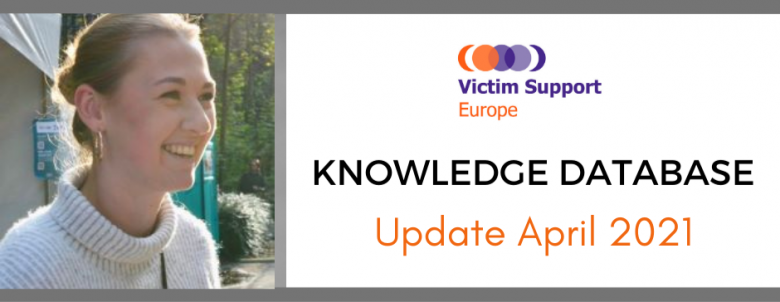
Knowledge Database – April 2021 Update
This month’s update is brought to you by VSE’s intern Louise Lacour. If you would like to submit publications to the Database, please reach out at vse@victimsupporteurope.eu
In the European Union, there are 100 million people with disabilities, and this number is still increasing. As people with disabilities experience increased vulnerability to victimisation, it is essential to adopt a victim-centred approach adjusted to the needs of this group of victims. This month’s additions to the Knowledge Database are composed of a variety of publications on the needs and rights of victims with disabilities. Let us now take a closer look at a few of these interesting publications.
Communicating with Individuals with Disabilities: Policies and Trainings for Law Enforcement Personnel by Christensen and Bezyak states that individuals with disabilities have a higher chance of coming into contact with law enforcement personnel. In addition, they are less likely to report a crime to law enforcement personnel than the general population due to communication barriers. The purpose of this study is to identify existing training programs for law enforcement personnel to promote effective communication between them and people with disabilities. The other purpose is to identify if there are examples of policies and procedures related to the interaction with individuals with disabilities.
In addition to the previous study, another important publication about the interaction of law enforcement personnel with people with disabilities. The partners of the Be.Safe project wrote a Guide for Police on how to Interact with People with Intellectual Disabilities, which focuses on victims with intellectual disabilities who fall victim of cyber violence. This document offers police officers guidance on how to interact with people with disabilities, but also some general information about intellectual disabilities and advice on accessibility.
As people with disabilities often become victims of hate crimes and these crimes are widely unknown, hidden and disregarded, the recognition of the magnitude of the problem is very important. The factsheet Disability Hate Crime by OSCE, offers information on recognition and reporting of hate crimes against people with disabilities. OSCE emphasizes the importance of recognition to effectively counter these hate crimes.
We hope you have enjoyed this overview as well as the new additions to the Knowledge Database. If you would like to have your organisation’s publication featured in the next article, please write to us at vse@victimsupporteurope.eu.
List of featured publications:
